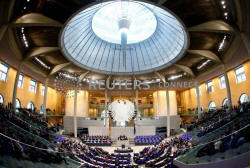German politicians' data published online, Merkel
unaffected
 Send a link to a friend
Send a link to a friend
 [January 04, 2019]
By Tassilo Hummel and Hans-Edzard Busemann [January 04, 2019]
By Tassilo Hummel and Hans-Edzard Busemann
BERLIN (Reuters) - Personal data and
documents from hundreds of German politicians and public figures have
been published online, the government said on Friday, adding that no
sensitive material from Chancellor Angela Merkel's office was released.
An Interior Ministry spokesman declined to confirm that the data breach,
which triggered an emergency meeting of the national cyber defense body,
was the result of a hack.
German media earlier reported that hackers had posted data including
credit card details and mobile phone numbers, with politicians from all
major parties affected apart from the right-wing Alternative for Germany
(AfD).
"Personal data and documents belonging to hundreds of politicians and
public figures have been published online," government spokeswoman
Martina Fietz told a news conference.
Judging by an initial review, no sensitive information from the
chancellery had been published, "and this includes (from) the
chancellor," she said.

Public broadcaster ARD, which broke the story, said its journalists had
as yet detected no incriminating content.
A defense ministry spokesman said the armed forces were not affected
either.
SERIES OF HACKS
Cyber defense body BSI met early on Friday to coordinate the response of
federal government agencies including the domestic and foreign
intelligence agencies, a spokesman said.
If the data release does stem from a hack, it would be the latest in a
number of hi-tech assaults on Germany's political institutions and key
individuals.
Last year, lawmakers said a powerful cyber attack breached the foreign
ministry's computer network.
Security officials have blamed most previous attacks on a Russian
hacking group APT28 that experts say has close ties to a Russian spy
agency. Security experts have held the same group responsible for an
attack ahead of the 2016 U.S. presidential election.
[to top of second column] |

German Chancellor Angela Merkel addresses the lower house of
parliament Bundestag in Berlin, Germany December 12, 2018. REUTERS/Fabrizio
Bensch/File Photo

The Kremlin, responding to previous allegations of cyber attacks on
foreign computer infrastructure, has denied any involvement and said the
accusations are part of a Russophobic witch-hunt.
"This data breach of hundreds of German politicians is alarming, but at
the same time it's not surprising," said Mike Hart at commercial cyber
security firm FireEye, citing previous hacks.
"...It highlights the need for the government to take cyber security
very seriously."
Politicians from the far-left Linke party were among those affected,
including Dietmar Bartsch, leader of its group in the lower
parliamentary house, a spokesman said.
ARD reported earlier that the data, from hundreds of politicians and published
on a Twitter account, included addresses, personal letters and copies of
identity cards, citing affiliate rbb.
The identity of the hackers and their motive were not known, the report said.
"Whoever is responsible, wants to intimidate politicians. That will not
succeed," said Lars Klingbeil, secretary general of the center-left Social
Democrats, Merkel's coalition partner.
Bild newspaper said the secure internal network of Germany's government was not
hit by the hackers, citing sources inside the BSI.
(Additional reporting by Joseph Nasr and Jack Stubbs; writing by Paul Carrel,
editing by John Stonestreet)
[© 2019 Thomson Reuters. All rights
reserved.] Copyright 2019 Reuters. All rights reserved. This material may not be published,
broadcast, rewritten or redistributed.
Thompson Reuters is solely responsible for this content.
 |